A Deep Dive into the Boruto Series: Themes and Impact
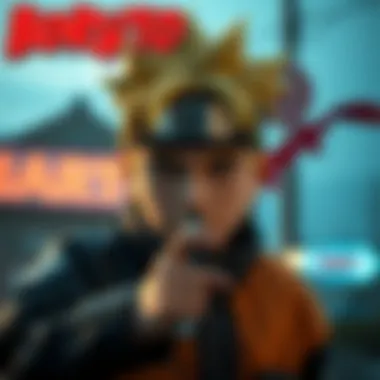

Intro
The Boruto series stands as a significant continuation of the illustrious Naruto universe, expanding its vast landscape of characters, themes, and cultural narratives. As it rolls out in English, the series has garnered attention not only for its story but also for the intricacies involved in its translation and adaptation. This analysis dives into various aspects of Boruto, unearthing how it retains the essence of its predecessor while charting its own course.
Music plays a crucial role in anime, and the score in Boruto captures the emotional undertones shared by generations of viewers. While the new generation navigates their own struggles, echoes of Naruto’s adventures resonate in poignant moments. From heart-wrenching farewells to exhilarating battles, Boruto is an amalgamation of familiar motifs wrapped in fresh narratives.
The character development also sees a notable shift. Boruto Uzumaki, the titular character, unpacks layers of complexity—grappling with expectations from his father, Naruto, who has matured to the role of Hokage. Here we witness a thoughtful exploration of legacy, identity, and the weight of familial ties, offering a rich palette for fans and new viewers alike.
Translation choices have become pivotal in shaping the perception of this series across English-speaking audiences. Certain phrases carry cultural nuances that may elude direct translation, impacting the overall viewing experience. Consequently, understanding the interplay of language and storytelling becomes paramount in grasping the themes presented in Boruto.
In the subsequent sections, we will provide a comprehensive overview that encompasses:
- The cultural implications of Boruto; how they align and diverge from Naruto’s legacy.
- Insights into character evolution, focused on both primary and secondary roles.
- The impact of translation and how it shapes narratives in different cultural contexts.
- Industry trends that may influence future narratives in anime and manga.
Einstein said, "If you can't explain it simply, you don't understand it well enough." This article strives to dissect and present the essence of Boruto with clarity and depth, ensuring that every perspective considered adds to an enriched understanding of the series.
Intro to Boruto
The transition from the revered Naruto series to its sequel, Boruto, marks more than just a continuation of a beloved narrative. This article sets out to dissect the importance of Boruto within the larger fabric of the Naruto franchise. By delving into the groundwork established in the original series and scrutinizing the evolution of characters and themes in Boruto, fans and newcomers alike can better appreciate the intricate storytelling at play.
Overview of the Naruto Franchise
The Naruto franchise is a global phenomenon that has resonated with audiences since its debut in the early 2000s. With its compelling themes of friendship, perseverance, and self-discovery, Naruto has carved a niche that surpasses mere entertainment. Its rich mythology and character arcs laid the foundation for Boruto, making the transition between the two series not just significant but necessary.
- Key aspects of the Naruto franchise include:
- Character Development: Characters evolve over time, their journeys intertwining with broader societal issues and personal growth.
- World Building: The detailed ninja world, complete with its geographical and cultural nuances, serves as a backdrop for deep storytelling.
- Themes of Legacy: The exploration of heritage, dreams, and the burden of expectations resonates throughout the series, aligning the two narratives.
With this foundation, Boruto stands as both a continuation of the story and as a new lens through which to view the concept of what it means to be a ninja in a rapidly changing world.
Transition from Naruto to Boruto
The leap from Naruto to Boruto is not merely a matter of passing the torch; it involves addressing the complexities that arise when a new generation navigates a legacy laden with expectations. Boruto's story doesn’t just pick up where Naruto left off—it reexamines the implications of a world where peace has been achieved, yet lingering challenges persist.
- Considerations for this transition include:
- Character Relationships: Boruto’s dynamic with his father, Naruto, reveals layers of both admiration and frustration, painting a picture of modern familial challenges.
- Technological Integration: The new series introduces advanced technology into the traditional ninja landscape, showcasing a blend of the old and new, which raises questions about the essence of being a ninja.
- New Conflicts and Themes: Boruto tackles issues like identity and personal ambition, which might resonate differently with contemporary audiences, compared to the ideals of camaraderie and struggle prevalent in Naruto.
The transition from Naruto to Boruto represents a microcosm of generational shifts, echoing real-world sentiments about legacy, ambition, and acceptance.
As the Boruto series unfolds, it encapsulates the spirit of a new generation, while still paying homage to its predecessor. Understanding this transition equips viewers to appreciate not only Boruto’s narrative but also its cultural resonance within the broader scope of anime and pop culture.
Plot Summary of Boruto
The plot summary of Boruto serves as a linchpin within this article, presenting readers with a structured overview of the series' narrative. With Boruto Uzumaki at its core, the sequel weaves a tale that merges the nostalgia of Naruto's legacy with the challenges faced by a new generation. Understanding the key elements of this plot is essential as it enables the audience to grasp how past experiences shape Boruto’s identity and his relationships with both peers and mentors alike.
Setting and Context
The setting of Boruto isn’t simply a backdrop; it acts as a character in its own right. The series takes place in a more modernized Hidden Leaf Village, where technology has seeped into the daily lives of its inhabitants. This shift represents a stark contrast to Naruto’s era, originally steeped in traditional ninja ideals. As you stroll through Konoha, there are vehicles, smartphones, and even advanced ninja tools that make the scenes feel almost like a blend of medieval and modern times.
This evolution in setting lays the groundwork for the themes of legacy and innovation, intertwining the past with the present. For example, Boruto's struggle against his father’s monumental legacy echoes throughout the series. It draws a stark comparison to how Naruto once chafed under the expectations set before him. This generational context enriches the narrative and highlights the complexities both characters face in claiming their identities.
Main Story Arcs
The main story arcs in Boruto provide a skeleton upon which various character interactions and plot developments hang. Unlike its predecessor, which largely focused on the personal growth of a single character, Boruto expands its narrative canvas to include a broader ensemble. Some key arcs include:
- The Chunin Exams Arc: This is a pivotal part of the series where we witness the ambition and rivalry among the new generation of ninjas. The tension escalates as Boruto faces challenges, often overshadowing the traditional elements of the exam with his own style and approach.
- The Mitsuki Retrieval Arc: This arc further enriches the lore by exploring Mitsuki’s origins and his connection to Boruto. It emphasizes themes of friendship and self-discovery, allowing for in-depth character analysis and rising stakes.
- The Kawaki Arc: Introducing a new dynamic, Kawaki’s arrival signals a shift in the narrative tone, pulling Boruto and his friends into a conflict that tests their limits and ideals. This arc drives home the chosen family versus biological family theme.
Each story arc invites us deeper into the very essence of Boruto’s world. With layered conflicts and multifaceted character development, the arcs serve as mirrors reflecting the trials of adolescence, belonging, and the quest for identity in both new and familiar ways.
Understanding the plot is not just about following the storyline; it is essential for appreciating the depth of themes and character relationships present in Boruto.
Character Analyses
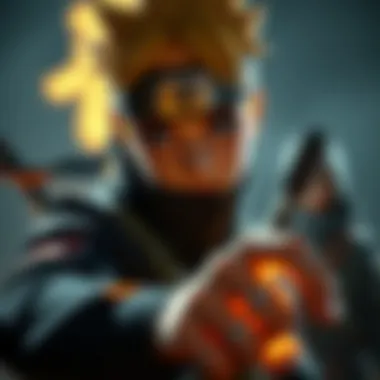
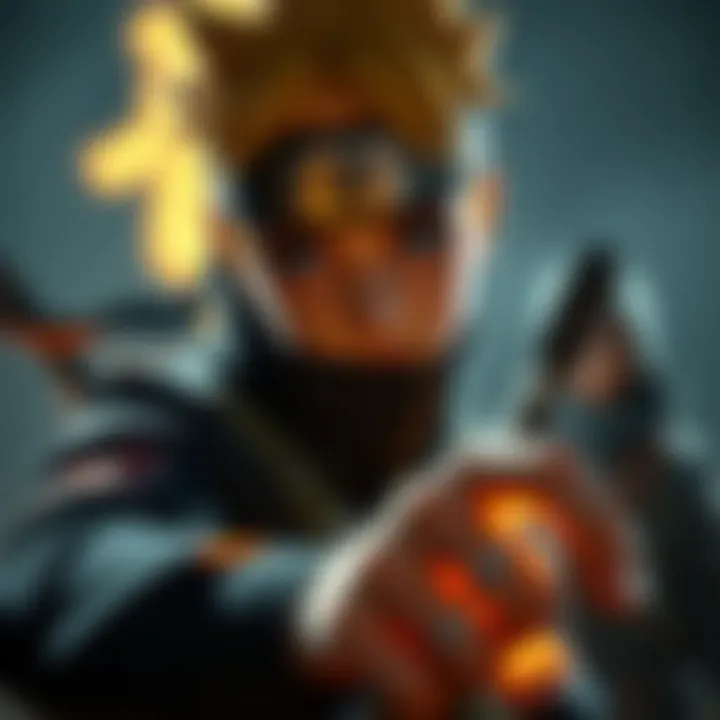
The analysis of characters in the Boruto series holds significant weight in understanding the narrative's overall impact and thematic depth. Character analyses provide a lens through which audiences can perceive not just individual journeys, but also the evolution of legacies passed down from the Naruto series. By delving into the complexities of these characters, we gain insight into their motivations, struggles, and growth, which reflects broader themes such as identity, responsibility, and the intertwining of tradition with modernity.
Moreover, examining characters like Boruto Uzumaki, Sarada Uchiha, Mitsuki, and Konohamaru Sarutobi reveals how their stories resonate with or diverge from their predecessors. This exploration enriches the viewer's understanding of the narrative's continuity and change, making it a vital aspect of engaging with the series on a deeper level.
Boruto Uzumaki: A Complex Legacy
Boruto Uzumaki stands at the forefront of the series, grappling with the weight of expectations as the son of Naruto Uzumaki, the Seventh Hokage. His character serves as a fascinating mirror to his father, yet he vehemently desires to carve his own path, which is a major highlight of his journey. Rather than simply following in Naruto's heroic footsteps, Boruto often finds himself in conflict with his father's ideals, especially regarding the reliance on technology, which leads to a critical tension throughout the series.
One key characteristic of Boruto is his rebellious nature. This aspect makes him a relatable figure for a new generation, showcasing struggles that many young people face today, such as carving out an independent identity while dealing with parental expectations. Ultimately, this complex foundation leads to a rich narrative that not only explores Boruto's growth but also reflects the difficulties many face in finding their way in a world shaped by the achievements of others.
Supporting Characters and Their Roles
Sarada Uchiha
Sarada Uchiha embodies the duality of tradition and ambition. As the daughter of Sasuke Uchiha and Sakura Haruno, she carries a powerful legacy, yet constantly seeks her own identity apart from her parents. Her aspiration of becoming the Hokage reveals her determination and strength, making her a relatable character within the series. The desire to break familial molds is a prominent theme that emerges through Sarada, contributing significantly to the narrative.
What sets Sarada apart is her relentless pursuit of her goals, paired with a nuanced understanding of the weight of her lineage. Her experience reveals the struggles of balancing expectation with personal ambition. However, this compelling character journey also brings the advantage of exploring a female perspective in a traditionally male-centered narrative, showcasing the multifaceted nature of leadership and strength.
Mitsuki
Mitsuki represents the quests of identity and self-discovery. Being a synthetic human created by Orochimaru, he wrestles with questions of humanity and belonging. Mitsuki's friendship with Boruto adds layers to his character, illustrating loyalty and the importance of connection. His unique background not only makes him a compelling ally to Boruto but also stimulates discussions around what it truly means to be human.
Mitsuki’s key characteristic is his calm demeanor, often serving as the voice of reason within the group. This makes him a beneficial choice for character analysis as it showcases a contrasting perspective to Boruto's impulsiveness. Moreover, Mitsuki's origins and his struggles reflect broader themes of acceptance and the search for one's place within the world.
Konohamaru Sarutobi
Konohamaru Sarutobi offers a bridge between the old and new generations. As Naruto's former pupil and Sarutobi's grandson, he embodies the new Hokage's aspirations while confronting his own challenges as a mentor. His evolution from a mischievous child into a responsible teacher reflects critical themes of growth and community commitment.
One key characteristic of Konohamaru is his dedication to mentoring Boruto and his friends, emphasizing the importance of teaching and passing down knowledge. However, Konohamaru's struggle to step out of Naruto's shadow poses challenges that make his journey relatable. Analyzing his character adds depth to the theme of legacy, offering insight into how leadership must adapt and evolve across generations.
"In every character analysis, we uncover not just how they fit into the narrative, but also how their personal stories enrich the broader tapestry of Boruto's world."
Through such character studies, audiences can appreciate the intricate layers that Boruto brings to the table, making the series not just a successor to Naruto, but an entity that stands on its own with messages strikingly relevant to today's world.
Themes in Boruto
Understanding the themes in Boruto is not just an academic exercise; it’s a fundamental part of grasping what this series signifies within the larger Naruto universe. These themes shape characters, influence plot development, and even serve as a lens through which viewers can critique societal norms and priorities. In a world where classic ideals of heroism and perseverance meet new challenges, Boruto presents a narrative that delves into legacy, identity, and the encroaching presence of technology in the ninja world.
Legacy and Identity
The theme of legacy is at the heart of Boruto's story, serving as both a burden and a guiding force for its characters. Boruto Uzumaki, the protagonist, is the son of Naruto Uzumaki, a legend in his own right. This legacy creates a double-edged sword for Boruto; he grapples not only with living up to his father’s reputation but also with forging his own identity. The pressure to succeed while distinguishing himself from Naruto is a familiar yet profound struggle that speaks to anyone caught in the shadow of significant expectations.
As viewers witness Boruto navigate this turbulent landscape, they are reminded that identity is not merely a matter of heritage. It is shaped by choices, challenges, and the paths one decides to take. By rejecting certain aspects of Naruto’s legacy—such as his relentless adherence to hard work—Boruto ultimately seeks not just to distance himself, but to redefine what it means to be a hero in a world that has evolved significantly since his father’s time. This exploration of identity resonates with a broad audience who likewise confronts the complexity of personal and family expectations.
"Legacies can be a blessing or a curse, and understanding which one it is shapes who you become."
Moreover, supporting characters like Sarada Uchiha and Mitsuki also embody the complexity of legacy in their own ways. Sarada, the daughter of Sasuke Uchiha and Sakura Haruno, deals with her lineage while aspiring to carve out her destiny in the shinobi world. Mitsuki, who is a synthetic human, faces unique challenges about his identity, particularly about what it means to be 'real' in a world that increasingly blurs the lines between human and technology. These individual journeys reflect the broader narrative that the series offers about understanding one’s identity amidst the thundering footsteps of those who walked before.
The Impact of Technology on Ninja Culture
Another critical theme woven throughout Boruto is the impact of technology on traditional ninja culture. As the series unfolds, viewers see a world where advanced gadgets and machines change the way ninjas operate. This technology is a double-edged sword; while it enhances abilities and makes tasks easier, it risks undermining the age-old values of the shinobi way.
In a remarkable contrast to the original Naruto series, which largely focused on manual skills and emotional connections between characters, Boruto introduces elements like automated combat tools and communication devices, which poses an essential question: Are ninjas turning into soldiers equipped with technology rather than warriors relying on their instincts?
The emergence of technology not only alters battle strategies but also affects interpersonal relationships among ninjas. Characters must now navigate this new terrain, balancing the advantages of technology with the potential pitfalls it presents. For example, the transition to using scientific tools in fights raises ethical questions and can create a gap between generations of ninjas—those who fought with their bare hands and hearts versus those who trust in gadgets.
Such conflicts reveal broader societal issues about progress and tradition, making Boruto a narrative not only of young heroes but of a shifting culture. The series invites viewers to reflect on how technology impacts their own lives, urging them to consider the balance between embracing innovation and retaining the core values that define humanity.
Cultural Impact of Boruto
The cultural impact of Boruto cannot be overlooked, especially when we consider its roots in the rich tapestry of the Naruto series. While Naruto laid the groundwork with its coming-of-age themes and elaborate lore, Boruto continues to navigate similar waters while tackling new societal issues. In doing so, it offers viewers not just entertainment but commentary on current cultural concepts.
Reception in Japan vs. the West
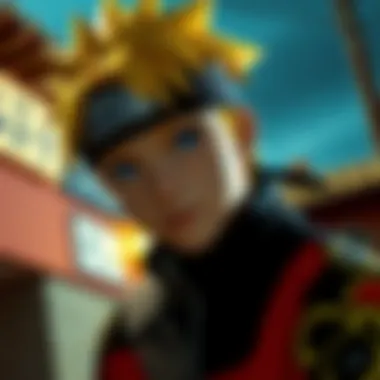
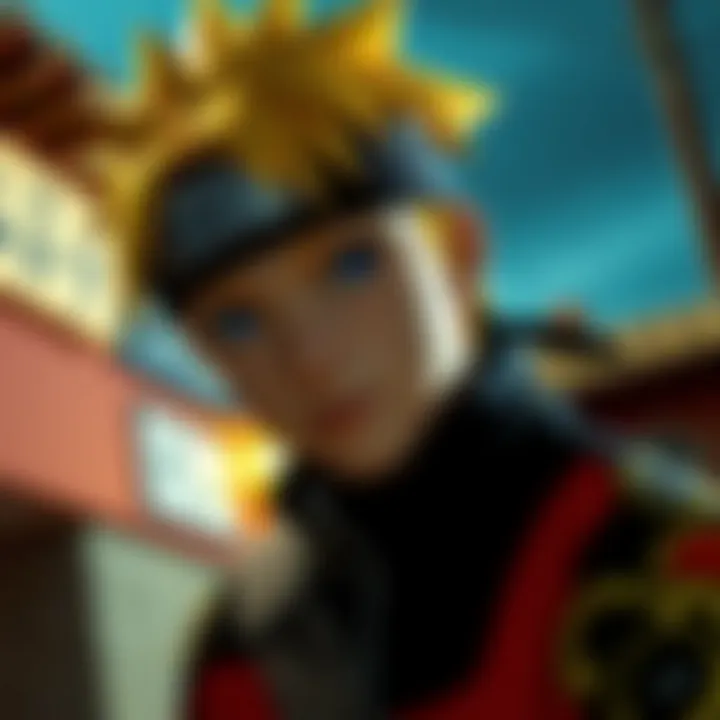
In Japan, Boruto experienced a mixed bag of responses. Long-time fans of the Naruto franchise were eager to see the continuation of the story, but many were divided over the portrayal of characters like Boruto Uzumaki himself. Furthermore, themes of generational conflict resonate deeply in Japan, where tradition and modernity often clash. This landscape led to a heightened anticipation and scrutiny over how the character development would play out.
Conversely, in the West, audiences are still warming up to Boruto. Cultural perceptions vary—with many viewers initially critical of Boruto's contrasting demeanor compared to his father Naruto's. The fascination with storytelling nuances has driven discussions about the differing receptions. Western audiences, often viewing anime as a window into Japanese culture, elevate their appreciation for elements like family dynamics and ethical dilemmas. The reception can be shaped by broader societal attitudes, highlighting how Boruto, while continuing Naruto, touches on themes that may be especially relevant to Western viewers today.
"Cultural interpretations significantly shape our understanding of character motivations and narrative outcomes in series like Boruto."
Boruto in Pop Culture
Boruto has infiltrated various facets of pop culture in ways both familiar and novel. Merchandise, cosplay, and fan art flourish, creating vibrant community engagement. For instance, you will see Naruto Uzumaki and his son Boruto at anime conventions, where attendees often juxtapose the generational differences between the two. This allows for lively discussions and camaraderie over shared stories.
Additionally, the series reveals how anime culture has evolved in alignment with technology. Mobile games featuring Boruto have become wildly popular, interacting with fans on a more personal level. Striking a chord with gamers, Boruto has found its rhythm within mobile platforms, further solidifying its standing in modern pop culture.
Several notable trends stem from Boruto's impact on the anime community:
- Merchandising Opportunities: The series has spurred a new wave of merchandise that attracts both longtime fans and new audiences.
- Influences on Other Media: Other series are adapting character designs or thematic elements inspired by Boruto's approach to storytelling and character dynamics.
- Increased Global Accessibility: Streaming platforms have contributed to the spread of Boruto beyond traditional barriers, allowing it to reach a diverse audience worldwide.
As Boruto continues to unfold, its cultural significance grows, urging us to reflect on legacy, identity, and the impact of technology—all while remaining firmly entrenched in the beloved narrative groundwork set by the original series.
The Role of English Translation
The world of anime and manga has become a veritable melting pot of cultures, and none more so than the Boruto series, which continues the legacy of its predecessor, Naruto. English translations play a crucial role in making this narrative accessible to a global audience. This section focuses on how translation not only bridges language gaps but also shapes interpretations, allowing non-Japanese viewers to fully engage with the series.
Challenges in Translation
Cultural Nuances
Cultural nuances represent one of the most significant challenges in translation. When the original material is steeped in Japanese traditions, idioms, and social contexts, a direct translation may fall flat or even misrepresent the essence of the story. For example, a specific phrase in Boruto may have a cultural weight that resonates deeply within Japan but sounds awkward when translated literally into English.
The key characteristic of addressing cultural nuances lies in a translator's ability to convey underlying meanings without losing the narrative's integrity. A successful adaptation often involves creating new phrases or expressions that evoke similar feelings and reactions among English-speaking audiences. One beneficial approach is the use of footnotes to explain context, which has become a popular choice among translators. This way, readers grasp not just what is said but why it matters, enriching the viewing experience. However, it's a balancing act; excessive notes might distract from the story flow.
In sum, understanding cultural nuances can enhance audience engagement, making them feel more connected to the characters and their struggles. This is a unique feature of the translation process that can either elevate the storytelling or leave it wanting.
Dialogue Adaptation
Dialogue adaptation is another tricky aspect of the translation process. The way characters speak often reflects their personality, background, and emotional state. For instance, a character's informal slang in Japanese may not have a direct counterpart in English. Translators must decide whether to keep the original tone or modify it to better resonate with the target audience.
The essence of dialogue adaptation lies in maintaining character integrity while making conversations sound natural in English. These decisions can be crucial because they can change how audiences perceive a character's intentions or emotional depth. The challenge here is to replicate the energy and dynamics of conversations without losing the originality of the characters.
One advantage of this approach is that it allows for a more relatable viewing experience. However, over-adaptation can lead to conflicts where the dialogue strays too far from the original, sometimes risking the subtleties that made the characters unique in the first place. The skillful art of dialogue adaptation aims to straddle this line.
Impact on Audience Reception
The translation of Boruto into English has significantly affected how audiences from different backgrounds perceive the show. A well-executed translation can foster a stronger connection between viewers and the narrative, leading to a wider appreciation of themes and character arcs. However, if translation misses the mark, audiences might be left confused or even frustrated.
For example, mistranslations can alter the tone of critical scenes, leading to misunderstandings about character motivations. On platforms like Reddit, discussions often revolve around translation quality, showing how closely fans scrutinize the dialogue. This highlights the importance of having a nuanced understanding of the source material to curate a cohesive viewing experience.
Moreover, the way humor, emotional moments, and cultural references are translated can deeply influence audience reception. A thoughtful translation preserves the story's emotional core, allowing it to reach audiences who may not share the same cultural background as the original creators. Through attentive adaptation, more fans can engage deeply with Boruto, enriching the overall landscape of anime appreciation in English-speaking communities.
"Translation is not a matter of words only: it is a matter of making intelligible a whole culture."
— Anthony Burgess
The careful attention given to translation in Boruto stands as a testament to its artistry and the dedication to connect with viewers worldwide.
Boruto vs. Naruto
The relationship between Boruto and Naruto serves as a foundation for exploring the new series. This connection is not simply a continuation of events; it represents a profound shift in themes and character exploration. Understanding this dynamic is crucial for gauging the nuances within Boruto, as it echoes aspects of legacy, modernity, and individual growth.
Comparative Overview
When we juxtapose Boruto and Naruto, a few elements stand out immediately:
- Character Motivations: Starting with Boruto, he grapples with the immense shadow cast by his father's legacy. While Naruto was driven by a desire for acceptance and acknowledgment, Boruto seeks to carve out his own path, often resenting the burdens of fame placed upon him.
- Themes of Technology vs. Tradition: Naruto's world was deeply rooted in traditional values of hard work and perseverance, centered around chakra-based combat and struggles. In contrast, Boruto's narrative incorporates technology, highlighting how modern advancements can create both opportunities and complications in a ninja’s life.
- Diverging Relationships: The relationships in Boruto have a distinct flavor. The parental relationship between Boruto and Naruto presents a complex landscape of expectations, as Boruto often feels his father's preoccupation with his duties overshadow his familial responsibilities.
These elements create a rich tapestry that engages fans, forcing them to reconsider what growth and change look like through the lenses of their favored characters.
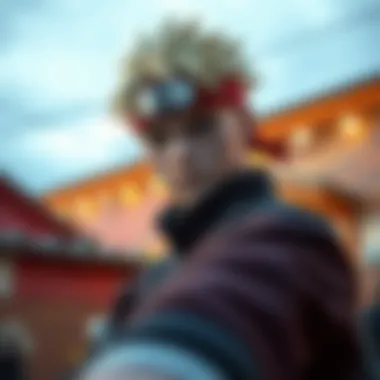

Narrative and Character Development
The character arcs in Boruto present a departure from those seen in Naruto, reflecting diverse struggles and aspirations:
- Boruto Uzumaki: He embodies a conflicted youth. As he navigates his relationship with his father, Boruto's character development emphasizes the theme of self-determination. His journey isn’t just about living up to Naruto; it’s more about reconciling his identity with his family legacy.
- New Characters: In Boruto, characters like Sarada Uchiha and Mitsuki, each with their backgrounds and motivations, rework the classic narrative style of Naruto. Sarada's pursuit of her identity as a Uchiha while wishing to become Hokage introduces fresh dynamics that contrast with the original series’ framework of linear growth.
- Evolution of Relationship Dynamics: Unlike Naruto, where bonds are often formed through trials, Boruto portrays that while friendships can grow, they can also strain under personal goals. This newfound complexity adds depth, making the story more relatable to contemporary audiences who face similar challenges in relationships and self-identity.
In closing, the contrasts between Boruto and Naruto stretch far beyond surface differences. They offer a layered examination of legacy, striving for independence, and the ongoing evolution of interpersonal connections in a rapidly changing world. Boruto does not merely stand on the shoulders of Naruto; it dares to ask the question: what comes next?
Critical Reception
The critical reception of the Boruto series is crucial in understanding its place within the Naruto universe and the broader realm of anime and manga. It encompasses the reviews from critics, analysis from fans, and the responses from the community that collectively shape the series’ identity and influence its future trajectory. Evaluating the critical reception allows us to gauge the series' impact, not just artistically but also in relation to its audience's expectations and experiences.
Critical Reviews and Feedback
The reviews of Boruto have been a mixed bag, reflecting the varied perspectives of both critics and viewers. Some critics have lauded the series for its ambitious storytelling and character development, pointing to Boruto Uzumaki's complex journey as emblematic of the new generation.
- Positive Feedback: Many reviewers have noted the fresh approach Boruto departs from its predecessor, suggesting that it explores themes of legacy and personal identity with a modern twist. Critics often highlight how Boruto’s relationship with Sarada and Mitsuki introduces new dynamics that keep the narrative engaging.
- Negative Feedback: Conversely, other critics argue that Boruto does not live up to the lofty standards set by Naruto. They express frustration with what they perceive as filler content, claiming that the series often fails to maintain a cohesive rhythm. Some point to a lack of depth in certain side characters, feeling that the series could have benefited from deeper explorations of their backgrounds and motivations.
One piece of feedback that stands out among critics is the pacing of the storyline, which affects the overall enjoyment for some viewers. Balancing episodic content with overarching arcs remains a challenge for the creators.
"While Boruto tries to carve out its own niche, the shadow of Naruto looms large, making it a constant comparison for fans."
Fan Reactions and Community Insights
Fan reactions to Boruto have evolved significantly since the series launched. Initially, there was skepticism; many fans were apprehensive about how a continuation of such a beloved story would unfold. However, as the narrative has progressed, community insights reveal a more nuanced understanding of the series.
- Online Discussions: Platforms like Reddit have become hotbeds for fan discussions, where members dissect episodes, share theories, and debate the decisions made by the creators. User insights often bring to light the unique perspectives fans possess based on their individual experiences with the Naruto franchise.
- Community Projects: Engaging with the series has also led to various fan projects, including fan art and fan fiction, showcasing the series's ability to inspire creativity within the community. These contributions not only enrich the Boruto experience but also foster a sense of belonging among fans.
In summary, the critical reception of Boruto serves as a reflection of the series' ongoing evolution. Balancing criticism with engaging community interactions highlights the vibrant landscape of fandom that shapes how the series is perceived. As Boruto continues to unfold its narrative, the discussions surrounding it promise to remain as dynamic and diverse as the characters themselves.
Future of the Boruto Series
The evolution of the Boruto series remains a topic of fervent discussion among fans and critics alike. As we consider its future, several elements merit attention. The narrative trajectory shows promise, indicating that the creators are keen to expand the universe while preserving the essence of the original Naruto franchise. This balance between tradition and innovation is crucial for maintaining interest in the series as it continues to grow.
A significant aspect to note is how future story arcs will intertwine with the characters’ personal growth and the overarching themes of legacy. Boruto’s journey, despite its initial perception as a mere continuation, has become a vessel for exploring deeper philosophical questions. As viewers step further into this world, they are likely to encounter more complex arcs that challenge the status quo of ninja customs and generational conflicts.
Upcoming Story Arcs
The anticipation surrounding upcoming story arcs has created a buzz in the fandom. Based on various hints dropped in the manga and anime, fans can expect arcs that delve into:
- The return of legacy characters: Key figures from the Naruto series might make appearances, likely sparking nostalgia while also contributing to Boruto’s development.
- New challenges: The introduction of formidable antagonists who hold significant ties to the current era could provide a fresh perspective on existing dilemmas, pushing Boruto and his companions to their limits.
- Cultural conflicts: As technology continues to alter the ninja way, storylines could explore the tensions between traditional values and modern advancements, reflecting real-world societal debates.
These arcs promise not just thrilling encounters but also a chance to see how Boruto and his friends reconcile their past with the demands of the present.
Prospects for New Characters
Alongside existing characters, the introduction of new personalities will undoubtedly shape the Boruto series. With each new character, the narrative landscape broadens. Fans are particularly keen on:
- Unique skill sets and abilities: New characters might bring fresh fighting techniques or ideologies that challenge Boruto's perspectives. Their interactions will enrich the storyline, offering opportunities for growth and alliance.
- Diverse backgrounds: As the series progresses, a varied cast with different cultural influences can introduce exciting dynamics and storytelling possibilities. This diversity can resonate with a broader audience, fostering inclusivity.
- Potential role models: Characters who may act as mentors or rivals to Boruto will serve as catalysts for his own transformation. Seeing Boruto navigate these relationships is crucial in keeping his arc relatable and compelling.
The new blood in the series seems promising. As Boruto's adventures continue, the impact of these characters on his journey will undoubtedly keep viewers eagerly anticipating each episode. The path forward for the Boruto series is ripe with possibilities, and its faithful followers are ready to see how it all unfolds.
Finale
The conclusion of this article serves as a pivotal moment to reflect on the Boruto series, emphasizing its vital connections within the expansive universe originally formed by the Naruto franchise. It is not merely an ending, but a synthesis of the rich discussions and insights provided throughout the previous sections. Here, the essence of Boruto is distilled into its core elements, illustrating its significance for both seasoned fans and newcomers.
First off, it’s paramount to acknowledge the intricate character development showcased in Boruto. Each character, especially Boruto Uzumaki himself, navigates their legacy with a fresh perspective that intertwines the old with a new narrative style. This duality mirrors the experiences of real-life transitions, where the torch is passed, filled with both expectations and opportunities to forge one's own identity.
Moreover, the thematic richness of Boruto cannot be underestimated. The exploration of legacy and technology stands out, drawing a parallel between the characters’ ninja lives and the contemporary challenges faced by society. It invites the audience to ponder how modernity reshapes traditional values, a conversation that resonates deeply in today’s context.
In addition, the cultural impacts explored throughout the article underscore the reception in both Japan and Western nations. The adaptability of Boruto, seen in its translation choices, showcases how certain cultural nuances can either bridge gaps or create barriers in understanding. Engaging with the series in English prompts an analysis of how different audiences interpret the same materials in distinct ways.
This analysis concludes with a note of optimism towards the future arcs and character developments waiting to unfold. As new storylines are introduced, there is an intrinsic opportunity for continuous growth, echoing the primary message of Boruto: the journey of discovering oneself never ends. Each arc contributes uniquely to the tapestry of the Naruto universe, enriching the narrative and offering fans both old and new an endless frontier of exploration.
Lastly, embracing Boruto means embracing a dialogue about change, growth, and the paths one chooses—an essential narrative that mirrors our own lives.
"In every ending lies a new beginning."
Through this analysis, we hope to not only inform but also inspire an ongoing discourse among perhaps a rather discerning audience about what makes Boruto not a mere successor, but a worthy companion to its predecessor.



